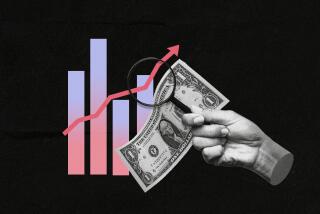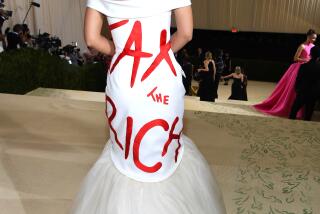A Rich Source of Controversy
- Share via
Who’s wealthy and who isn’t? It’s all a matter of perspective. “A man who has a million dollars,” John J. Astor III once remarked, “is as well off as if he were rich.” Yes, indeed. But these days, at least as far as the government is concerned, it hardly takes a seven-figure income to be counted among the affluent.
The way the Census Bureau figures it, a household income of $65,124 is enough to place a family in the wealthiest 20% of the population. The Treasury aims higher, using a figure of $93,222. But that includes what it calls “imputed” income, meaning such things as untaxed fringe benefits and, most controversially, the monthly housing check you no longer have to write if you have paid off your mortgage. This may make sense to economists, but what it overlooks as far as real people are concerned is that to get free of that mortgage you might have had to scrimp, save, sacrifice and suffer, forgoing many of the earthly delights others were enjoying. In other words, you might for years have had to accept a lower living standard to get clear of housing debt. Let the Treasury quantify that possibility when next it imputes.
The question of who’s rich came up again during the debate between Democrats and Republicans over how $85 billion in tax cuts should be divvied up. Many members of the great middle class who followed that debate were no doubt surprised to find that, contrary to what they might feel, and certainly to how they might live, they were identified as being quite well off. But look again at the threshold number the Census Bureau uses for entry into the top one-fifth of households: $65,124. A nice income, to which many Americans aspire. But also an income that these days can be achieved by the distinctly non-wealthy, say, a postal worker married to a bus driver, or a police officer married to a teacher. Such households may be comfortable, to much of the population enviably so. But to describe them as rich abuses the meaning of the word.
So who is really wealthy? As we said, it’s all a matter of perspective. Just as the definition of old age has changed as our life spans have lengthened, so does the definition of “rich” steadily change as incomes grow and net worth expands. “The rich are different from us,” F. Scott Fitzgerald once famously commented to Ernest Hemingway. “Yes,” was the reply, “they have more money.” And that probably pretty well sums it up. The rich are the people who have more money than we do, and no matter how much better off we become that’s the way it’s always likely to be.
More to Read
Inside the business of entertainment
The Wide Shot brings you news, analysis and insights on everything from streaming wars to production — and what it all means for the future.
You may occasionally receive promotional content from the Los Angeles Times.










